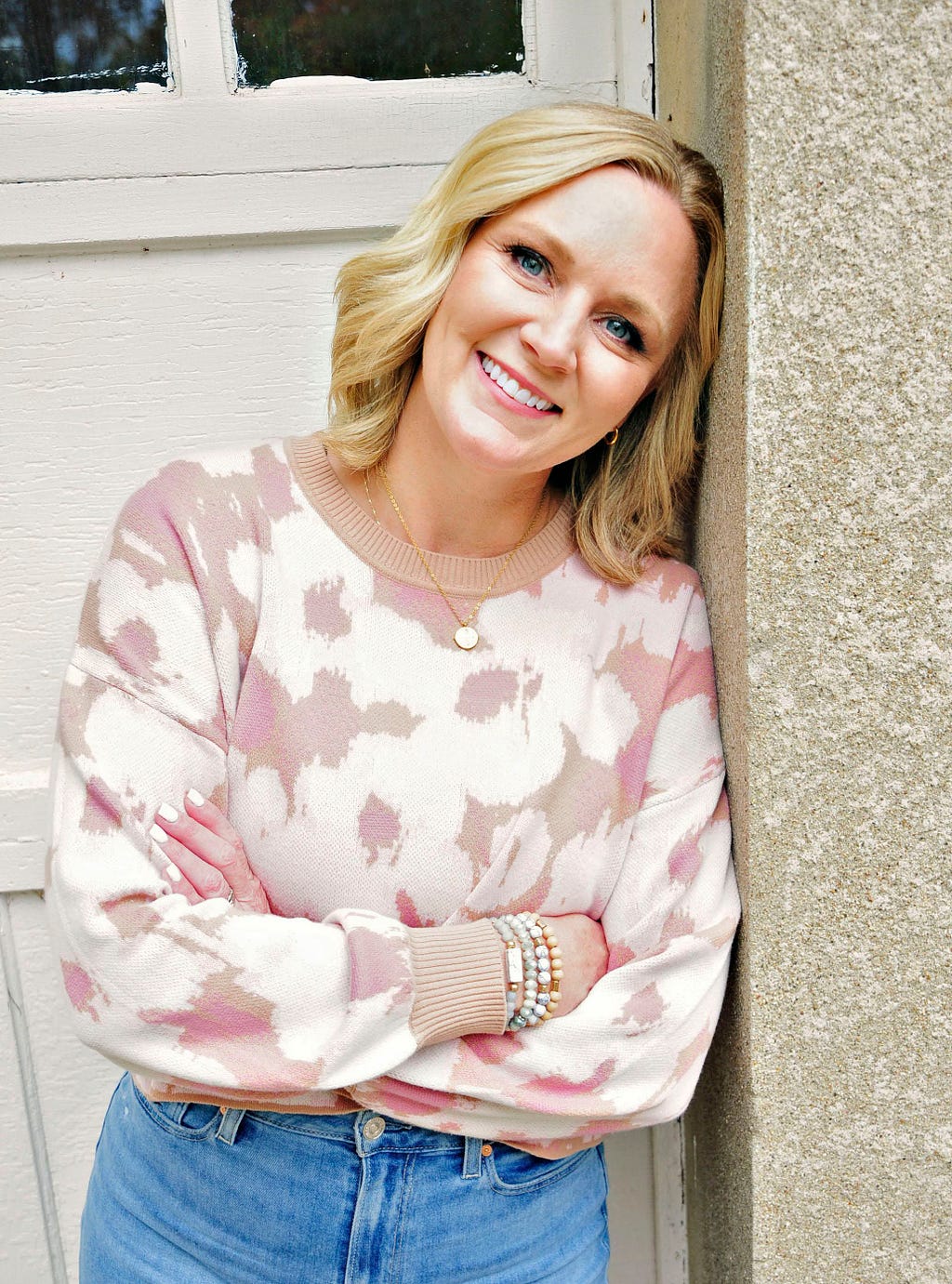
“Take each step as a learning opportunity.” I have learned a lot about publishing a book, I was so naive to the process and all the logistics that are involved.
As part of my series about “authors who are making an important social impact”, I had the pleasure of interviewing Molly Rubesh.
“Is Heaven farther than the North Pole?” is a question Molly Rubesh’s youngest son asked her after his biological mom passed away. It was a question she struggled to answer, and when her father passed away in 2022, she decided to combine her children’s grief with her own journey to look for signs of Heaven in our everyday life. Recently becoming a stay-at-home mom, Molly felt motivated to write “Is Heaven Farther Than the North Pole?” to help her children and herself as they search for solace, and to help other children and parents process their own grief. Molly currently resides in Indiana with her husband Grant and their four wonderful kids. Though she is still on her journey, she has indeed been able to find parts of Heaven in her search. Molly’s debut book, “Is Heaven farther than the North Pole?” is now available wherever books are sold.
Thank you so much for joining us in this interview series! Before we dive into the main focus of our interview, our readers would love to “get to know you” a bit better. Can you tell us a bit about your childhood backstory?
I was born in Lawrence, Kansas, and spent most of my life in the Midwest, moving between a few states while my dad worked in higher education. I was a shy child who would quickly learn that I needed to push myself outside of my comfort zone to make friends in a new school. Moving states, especially in middle and high school, would ultimately be one of my greatest blessings. Moving was tough, but the first-day jitters allowed me to lean on myself and trust that I could overcome vulnerability.
When you were younger, was there a book that you read that inspired you to take action or changed your life? Can you share a story about that?
I have fond memories of reading the Shel Silverstein books. My parents would read “The
Giving Tree” with me, and my brother and I would find our favorite poems in “Where the Sidewalk Ends” and “A Light in the Attic.” One of the biggest lessons is reading “The Giving Tree” back to our children. We can clearly feel the joy that giving parts of us to help them thrive is the ultimate reward.
Can you share the funniest or most interesting mistake that occurred to you in the course of your career? What lesson or take away did you learn from that?
The most interesting change in my career was my last role in corporate America. I was trying to navigate a new sales role, a difficult boss, and create an impact in my territory while managing the care of my dying father. Once he moved to hospice, I took medical leave to be with him during his last couple of weeks of life. After his passing, I knew I could no longer work in a corporate role. I was unsure of my future, but I was positive I wanted to “Be the change I wish to see in the world.” — Mahatma Gandhi.
Can you describe how you aim to make a significant social impact with your book?
Grief makes people uncomfortable. There is widespread hesitation to talk about or address grief with a grieving person, especially if that person is a child. No one wants to “make the child uncomfortable” or remind them of their loss. I can assure you that the child has not forgotten that their special person died. My goal is to educate and reduce barriers to discussing grief with kids. I want my platform to provide adults with talking points and arm them with resources to support their children. Mental health and the loss of a parent can negatively impact our children. Adults must have clear, open lines of communication, even if it brings on our own emotions. It’s ok to be sad and vulnerable with our children. However, they need our guidance on how to navigate this significant loss.
What was the “aha moment” or series of events that made you decide to bring your message to the greater world? Can you share a story about that?
One night when I was putting my son to bed, not long after the death of his biological mother, he asked me, “Is Heaven farther than the North Pole?” A question like that from such a young, innocent child stopped me in my tracks. How do I respond to something like that? We had a discussion that ultimately ended with me hesitating and saying, “I’m not sure.” It wasn’t until a few years later, when my father died, that I knew I had a better answer to that question. My dad died in the spring of 2022. We had a close relationship, and I cared for him at the end of his life. When he passed, I felt confident that he was with me, and his energy lives on. Over the summer, I took a deep interest in the beauty of nature and felt very connected to him. It dawned on me that I wanted to write a children’s book about grief, and even before I started writing the book, I knew the title had already been given to me years earlier by my youngest son.
Without sharing specific names, can you tell us a story about a particular individual who was impacted or helped by your cause?
A local therapist has read the book and has shared with me that this book has already created an impact on grieving children in her practice. At the end of the story, there is a short seek and find, which allows the reader to go back through the story and see how the signs of their mom were with them throughout the day. This therapist has hidden a few of the items in the book around her office and, after reading it, asks the kids to look for the signs even there in her room. In a recent note she sent me, she said, “I’ve used many books on grief through the years, but yours is, by far, the best! You turned your grief into a healing tool for others.”
Are there three things the community/society can do to help you address the root of the problem you are trying to solve?
- Be vulnerable with your children, especially grieving children. Tell the truth and show you are a human, too, with emotions. Allow them the space to grieve.
- Acknowledge grief and death. So often, we feel uncomfortable, or cannot find the words, so we say nothing. This can cause more hurt than saying the wrong thing. Just say something simple to let them know you see them and support them.
- Use conversation starters for grieving children. Use books, talking guides, and mental health professionals to process the significant loss.
How do you define “Leadership”? Can you explain what you mean or give an example?
Leadership is living an authentic life and guiding others toward a common goal.
Finding your true passion or staying true to your work (either professionally or personally) is the first step to being a successful leader.
What are your “5 things I wish someone told me when I first started,” and why. Please share a story or example for each.
1. “Take each step as a learning opportunity.” I have learned a lot about publishing a book, I was so naive to the process and all the logistics that are involved.
2. “You need to be vulnerable for the story to be authentic.” I knew we had to share our story to make me relatable but I want to continue to show grieving people they are not alone.
3. “Be brave.” Changing careers and going in a new direction has been challenging at times. I am thankful for my supportive friends and family who keep encouraging me.
Can you please give us your favorite “Life Lesson Quote”? Can you share how that was relevant to you in your life?
“Be the change you wish to see in the world.” — Mahatma Gandhi
We must model for our kids and those around us how to overcome some of life’s most significant obstacles. Mental health should be a priority for a grieving person and anyone navigating life. I have been dedicated to my mental health and feel compelled to tear down stigmas about seeking help. However, we shouldn’t just call on a mental health professional when we are at our darkest. Working on your mental health when you’re not in crisis will prepare you for the day when tragedy strikes. No one is immune to life’s difficulties, but I assure you, with the right help, and continued support, you’ll be adequately prepared for when life gets tough. It cannot take the pain away, but it can teach you how to respond healthily and productively.
Is there a person in the world, or in the US with whom you would like to have a private breakfast or lunch with, and why? He/she might just see this, especially if we tag them. 🙂
Yes! Brené Brown. I admire Brené and the work she does on vulnerability. Really, I admire all her work, but she has called me to be brave. This venture does not come without its dose of vulnerability, and just when I doubt myself, I find one of her books or podcasts that speaks directly to me. We need to live in the arena and face our fears. The courage to share our story comes with fear, but to make a lasting impact, I need to share it and allow others to know they are not alone in their grief journey.
How can our readers further follow your work online?
- Website: www.mollyrubesh.com
- Instagram: mollyrubesh.author
The book can be found here on Amazon, at Barnes and Noble, and Books a Million. Just search by the title.
This was very meaningful, thank you so much. We wish you only continued success on your great work!
Social Impact Authors: How & Why Author Molly Rubesh Is Helping To Change Our World was originally published in Authority Magazine on Medium, where people are continuing the conversation by highlighting and responding to this story.
